Related Research Articles
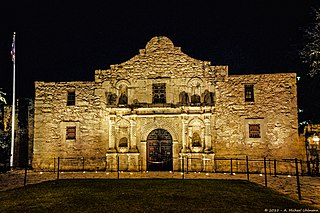
San Antonio, officially the City of San Antonio, is a city in and the county seat of Bexar County, Texas, United States. The city is the seventh-most populous in the United States, the second-largest in the Southern United States, and the second-most populous in Texas after Houston. It is the 17th-most populous city in North America, with 1,434,625 residents as of 2020.
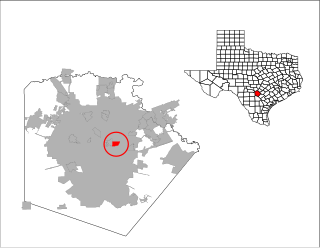
Terrell Hills is a city in Bexar County, Texas, United States; it is located 5 miles (8 km) northeast of downtown San Antonio. As of the 2020 census Terrell Hills had a population of 5,045. It is part of a group of three cities—Terrell Hills, Alamo Heights, and Olmos Park—located between Uptown San Antonio, Midtown San Antonio, Downtown San Antonio, and Fort Sam Houston. Terrell Hills is bordered on the west by Alamo Heights, on the east by Fort Sam Houston, on the north by Uptown San Antonio, and on the south by San Antonio's Near East Side. It is part of the San Antonio Metropolitan Statistical Area.

The Alamo is a historic Spanish mission and fortress compound founded in the 18th century by Roman Catholic missionaries in what is now San Antonio, Texas, United States. It was the site of the Battle of the Alamo in 1836, a pivotal event of the Texas Revolution in which American folk heroes James Bowie and Davy Crockett were killed. Today it is a museum in the Alamo Plaza Historic District and a part of the San Antonio Missions World Heritage Site.

The Daughters of the Republic of Texas (DRT) is a lineal association dedicated to perpetuating the memory of the founding families and soldiers of the Republic of Texas. The Daughters of the Republic of Texas is best known for its former role as caretakers of The Alamo. In early 2015, Texas Land Commissioner George P. Bush officially removed control of the Alamo to the Texas General Land Office. The DRT were also the custodians of the historic French Legation Museum until 2017, which is owned by the State of Texas and is now operated by the Texas Historical Commission. In addition, they operate a museum in Austin on the history of Texas.

The Alamodome is a 64,000-seat domed indoor multi-purpose stadium in San Antonio, Texas. It is located on the southeastern fringe of downtown San Antonio. The facility opened on May 15, 1993, having been constructed at a cost of $186 million.

The University of Texas at San Antonio (UTSA) is a public research university in San Antonio, Texas. With over 34,000 students across its four campuses spanning 758 acres, UTSA is the largest university in San Antonio and the eighth-largest by enrollment in the state of Texas. It is classified among "R1: Doctoral Universities – Very High Research Activity" and offers 159 degree options from its nine colleges.

The University of Texas at San Antonio (UTSA) Institute of Texan Cultures (ITC) is a museum and library located in the Texas Pavilion at HemisFair Park in Downtown San Antonio, Texas. The building which houses the institute a striking example of Brutalist architecture.

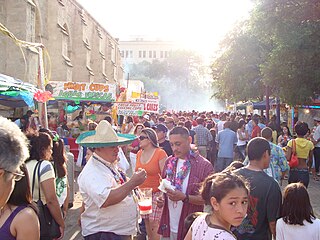
Fiesta San Antonio is an annual festival held in April in San Antonio, Texas, and is the city's signature event since 1891. The festival, also known as the Battle of Flowers, commemorates of the Battle of the Alamo, which took place in San Antonio, and the Battle of San Jacinto, which led to Texas' independence from Mexico in April 1836.
Mario Marcel Salas is a civil rights leader for over 30 years, and an author and politician. His parents were an Afro-Mexican father and a mixed race mother. He graduated from Phyllis Wheatley High School, an African American segregated school, which like many black schools across the country remained segregated long after the 1954 Brown v. Board of Education decision.

The Alamo City Rugby Football Club is an American rugby union club that is based in San Antonio, Texas. Alamo City RFC plays in the Texas Rugby Union Men's Division 2 league. Home matches are held at the Bowie Field rugby pitches located inside Brooks Park in southeast San Antonio, TX. The nickname for Alamo City Rugby is "The Defenders".

Greater San Antonio, officially designated San Antonio–New Braunfels, is an eight-county metropolitan area in the U.S. state of Texas defined by the Office of Management and Budget (OMB). The metropolitan area straddles South Texas and Central Texas and is on the southwestern corner of the Texas Triangle. The official 2020 U.S. census showed the metropolitan area's population at 2,558,143—up from a reported 1,711,103 in 2000—making it the 24th largest metropolitan area in the United States. Austin–Round Rock lies about 80 mi (130 km) northeast of Greater San Antonio.

The culture of San Antonio reflects the history and culture of one of the state's oldest and largest cities straddling the regional and cultural divide between South and Central Texas. Historically, San Antonio culture comes from a blend of Central Texas and South Texas (Southwestern) culture. Founded as a Spanish outpost and the first civil settlement in Texas, San Antonio is heavily influenced by Mexican American culture due to Texas formerly being part of Mexico and, previously, the Spanish Empire. The city also has significant German, Anglo, and African American cultural influences. San Antonio offers a host of cultural institutions, events, restaurants and nightlife in South Texas for both residents and visitors alike.
The city of San Antonio in the U.S. state of Texas is composed of a number of neighborhoods and districts, spreading out surrounding the central Downtown Area.

Downtown San Antonio is the central business district of San Antonio, Texas and the urban core of Greater San Antonio, a metropolitan area with nearly 2.5 million people.

The UTSA Roadrunners is a collegiate athletic program that represents the University of Texas at San Antonio (UTSA). The UTSA Roadrunners are also commonly referred to as "UTSA", "Roadrunners", or "Runners", and are represented by the mascot Rowdy. The origin of Rowdy dates back to 1977, when the Roadrunner was chosen as the university's mascot by student election.
The UTSA Roadrunners football program represents the University of Texas at San Antonio (UTSA) in the sport of American football. The Roadrunners compete in the Football Bowl Subdivision (FBS) of the National Collegiate Athletic Association (NCAA) and the American Athletic Conference. They are coached by Jeff Traylor, who started in 2020. The Roadrunners play their home games at the Alamodome, which has a seating capacity of 65,000 but whose capacity for UTSA games is normally restricted to 36,582.
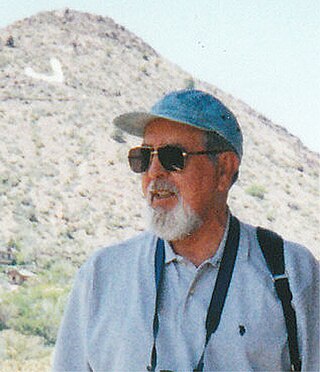
Jacinto Quirarte was an art historian, professor, scholar and writer who was instrumental in documenting and promoting Latino and Chicano art in the United States. Quirarte was an "expert in pre-Columbian and Latin American art history." He was one of the first to insist that pre-Columbian art and Latino art become part of the mainstream American art history narrative. He wrote many papers, monographs and several books on the subject of both ancient and modern art in the United States, Mexico, Central and South America. He is one of the founding deans of the University of Texas at San Antonio (UTSA). Quirarte was also one of the first Mexican-American scholars to work at the university level.
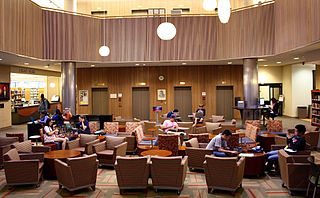
The University of Texas at San Antonio Libraries (UTSA Libraries) is the academic library of The University of Texas at San Antonio, a state research university in San Antonio, Texas, United States. UTSA Libraries consists of the John Peace Library (JPL) on the Main Campus, the Downtown Library, and the Applied Engineering and Technology (AET) Library. The libraries provide students and faculty with a comprehensive access to information as well as spaces for active learning, teaching, and interdisciplinary scholarship.
References
- 1 2 3 "Reference and Research". City of San Antonio . Retrieved May 2, 2020.
- 1 2 3 4 5 6 "About Archives & Records". City of San Antonio. Retrieved May 2, 2020.
- ↑ Ayala, Elaine (February 8, 2020). "Ayala: San Antonio's official record-keeper has become a champion of its most historic documents". San Antonio Express-News . Retrieved May 2, 2020.
- ↑ "San Antonio City Clerk Leticia Vacek Announces Retirement". City of San Antonio. February 14, 2020. Retrieved May 2, 2020.
- ↑ Peters, Anne (January 13, 2010). "UTSA Libraries new employees: Juli McLoone and Sean Heyliger". UTSA Today. University of Texas at San Antonio . Retrieved May 2, 2020.